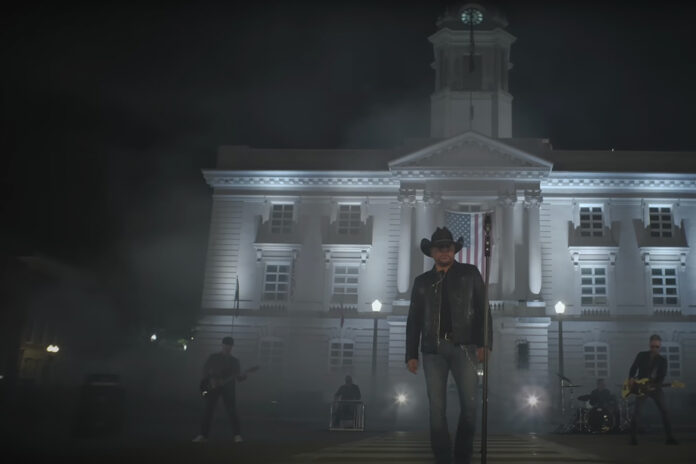To set the scene for the video for his song Try That in a Small Town, country singer Jason Aldean chose a courthouse…where the lynching of a young black man took place in 1927. Since its release, the video drew heavy criticism on social media, as the controversy pushed the song to the top of the most streamed in the United States. Decryption.
This time it’s Jason Aldean. On social media, the 46-year-old singer has been accused of encouraging gun violence and racism in the music video for his new track, Try That in a Small Town. Except that the controversy also had the effect of blowing up the number of plays. Embraced by the American right, the song is a hit. On Tuesday, it rose to number two on the Billboard Hot 100, the chart of the most popular songs, behind Seven by Jung Kook with Latto. Last week, the title sold 228,000 copies on download platforms, compared to 1,000 the week before the controversy.
In effect. At its unveiling, the song did not make much noise. It was the release of the music video, ten days ago, that set fire to the powder. Many noticed that it was filmed outside the Maury County Courthouse in Columbia, where an 18-year-old black boy was lynched in 1927. That’s not all. The music video also uses footage from Black Lives Matter protests which, layered over the lyrics, makes it seem like comparing protests against police brutality to violent crime. In the wake of the controversy, Country Music Television (CMT) announced that it would no longer air the music video. The Black Lives Matter footage has since been quietly removed from the clip, the Washington Post reported on Tuesday.
It depends on who you ask the question. For her admirers, she praises small rural towns where some watch over others. To her detractors, she instead glorifies racial violence and gun culture. The song begins with an enumeration of violent crimes (“Stealing an old lady’s car at a red light/Shooting liquor store owner”) and smearing behavior (“Swearing at a policeman, spit in the face/Stomp on the American flag and light it”). In the chorus, the singer issues a warning. “Try to do this in a small town / See how far you’ll go / Here we take care of our own,” he sings. Afterwards, he alludes to the conspiracy theory that the U.S. government plans to collect firearms from its citizens (“I got a gun that my grandfather gave me/ They say that one day they’ll pick them up”).
In effect. The song borrows several codes from the American right. Researcher at the Raoul-Dandurand Chair, Véronique Pronovost observes a “romanticization of the culture of firearms through the management of public safety by individual means, even small self-managed groups”. A form of vigilantism, what. The theme of “ideological division” is also apparent from the lyrics. When Jason Aldean sings “we take care of our own”, who is he referring to? “And who are the others?” African American communities? People committing wrongdoing? All progressive people? The controversy is there,” said Ms. Pronovost.
Essentially, he brushed the critics off the hook. On social media, he claimed that no lyrics “refer to race”. “I can try to respect individual interpretations, but that’s going too far,” he continued. In concert last weekend, the country singer once again denounced the controversy. “I’m proud to be American. I love our country. I want to see him go back to what he was before all this bullshit started happening to us. I love our country, I love my family and I will do anything to protect them,” he told a cheering crowd. Meanwhile, the production house behind the music video called the location where the video was filmed a popular filming location.
She was taken over politically. Donald Trump was quick to support the singer. “Jason Aldean is a fantastic man who just released an awesome song. Support Jason all the way,” the former president wrote on his social media, Truth. Republican presidential candidate and Florida Governor Ron DeSantis has also shown his support for Jason Aldean. “We need to restore sanity to this country,” he said in an interview, alluding to the cancel culture. According to Véronique Pronovost, this recovery is not surprising. “Generally speaking, culture is a great vehicle for getting political messages across. Left and right use it. What is interesting is that on the right-wing, culture, like politics, education, the media and the family, has become a privileged space that we wish to influence, even control, to spread a vision of what American society should be like,” she said.















